A Look Back: 25 Years of Women
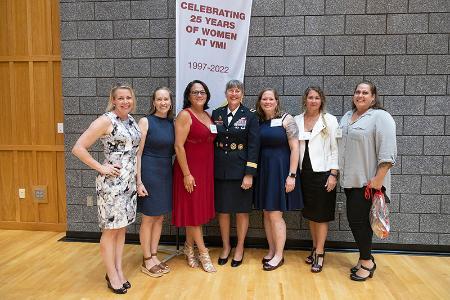
Maj. Gen. Marti Bissell poses with alumnae after her speech in Marshall Hall Sept. 9.—Photo courtesy of Micalyn Miller, VMI Alumni Agencies
LEXINGTON, Va., Sept. 28, 2022—The first females to sign their names in the matriculation book on August 19, 1997, had dreams of becoming cadets at VMI. It was on that day that 158 years of producing citizen-soldiers and offering an extraordinary education expanded from only men to now an opportunity for women as well. Since 1997, more than 1,000 women have signed the matriculation book.
The women of VMI were celebrated on post Sept. 8-10 at special events organized by the Alumni Agencies, with more than 200 alumnae and their families returning to Lexington. Alumnae panels offered insight on the paths of entrepreneurship, women in STEM, women in the military or first responders, and other topics highlighting how the VMI experience helped them get to where they are today. At the football game on Sept. 10 against Bucknell University, women of VMI were introduced on the field between each quarter, including Mildred Cooper ’05, the only female inducted (so far) into the VMI Sports Hall of Fame.
The transition in the mid-90’s though, took a lot of time, planning, hard work, and insight, which Maj. Gen. Marti Bissell, Deputy Commanding General National Guard of TRADOC, spoke about at a dinner during the celebratory weekend. While Bissell did not attend VMI, she has worked at the Institute in several roles and has a multitude of family ties to the school. Her father-in-law, then-Col. Mike Bissell ’61, was commandant and then became special assistant to the superintendent, responsible for the assimilation of women into VMI in every aspect. During that time, VMI would learn from others, create a committee system to bring together experts, build a feeling of ownership among the Corps, and communicate to all involved. In all the conversations with her father-in-law, she says “There was never any comments about how women didn’t belong, or that they wouldn’t be successful, only the desire to ensure that VMI would integrate women better than anyone else.”
Bissell also gives a lot of credit to Kevin Trujillo ’98 in her remarks. Trujillo was the 1st Class president during the 1997-98 academic year. She says to him, “I can tell you my father-in-law regularly spoke about what an influential role you played 25 years ago. While you could have done a lot to undermine the process, instead, you embraced the change and worked hard to make VMI’s coeducational process successful.”
Trujillo was quoted in 1997 saying, “All eyes are on VMI. Some are just salivating at the thought of our failure. The Corps of Cadets won’t give them the pleasure. Together, we’re making history.”
Bissell continued her remarks about the vast areas of cadet life that needed to be taken into consideration. “You name the topic that two people were discussing and there would be at least three opinions on what the right solution was.”
Some areas changed drastically, and some areas didn’t need to be changed much at all. Individuals who have been on post through the years have shared their experiences and what they learned through the process.
Barracks
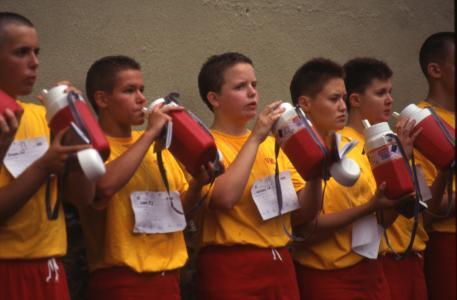
Male and female rats take a water break on Matriculation Day in August 1997.—Photo courtesy of VMI Archives.
No new cadet rooms were built in the barracks at that time, however privacy shades were added to each window as well as the windows on the doors of the cadet rooms. Several existing rooms were converted into ladies bathrooms, one on each floor.
Additional lighting was installed across post, including around the parade ground. “The parade ground was extremely dark at night,” said Larry Camper, chief of maintenance and operations, “we doubled the light poles at that time. We also had the emergency pull phones installed around post.”
Upper-class Cadets and Exchange Program
Since upper-class cadets were all male in 1997, VMI invited male and female cadets from Virginia Tech, Norwich University, and Texas A&M University in an exchange program to assist in training the female rats and mentoring the entire Corps during the transition. The visiting students took a full load of courses at VMI and returned to their home schools at the end of the semester or end of the academic year.
Hair
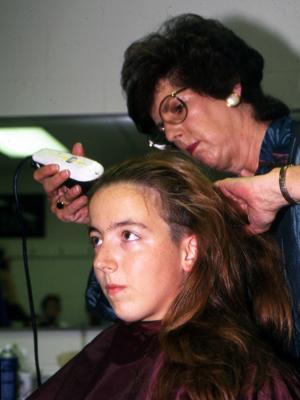
Brooke Green ’01 receives a buzz cut from Connie Hostetter in the VMI Barber Shop Aug. 19, 1997.—Photo courtesy of VMI Archives.
The first women to matriculate got the same service at the barber shop as the men: a close buzz cut. This has changed over the years. Glenda Dudley, manager of the VMI barber shop since 2012, has seen alterations in the styles allowed for female cadets. “My team and I have searched throughout the years for the right fit. There is no ‘one-size fits all’ when it comes to hair, so it truly has been an ongoing, evolving process in discovering what works,” said Dudley. She credits Army Regulation 670-1 regarding grooming standards, as a good policy to follow.
Occasionally, for Ring Figure and other special events, the barbers are asked to help with different styles for the female cadets. “We are hair stylists and enjoy working with female hair, so it is a treat for us to give the female cadets help with their hair. We will not do anything faddish though. Their hair should always look professional,” stated Dudley.
Uniforms
One can tell the difference between a shirt designed for a woman and one designed for a man based on which side the buttons are sewn. The same principle applies to pants, the zipper flap folds over the zipper one direction for men’s pants and the opposite direction for women’s pants. While traditional uniform items may be tailored differently for men and women, the uniforms were never designed specifically for women.
There were extensive conversations about skirts and other uniform pieces, along with the storage and distribution of the newly-added items. According to Blaine Noel, quartermaster of the military store, “There are gender-segregated fitting areas, and female employees fit female cadets, while male employees fit male cadets,” said Noel.
When fitting is complete, the uniforms are sent to the tailor shop for alterations. Cindy Hartbarger, manager of the tailor shop, said they now keep smaller sized chevrons in their inventory to accommodate the women’s smaller sized sleeves. “We also keep smaller collars to accommodate smaller neck sizes. We have the capability of switching out collars on the white blouses. It takes several weeks for us to alter the uniforms and get them to laundry where the cadets pick them up. By then though, the cadet may have lost weight, or bulked up, so they may have to have their uniforms altered again so it fits properly,” explained Hartbarger.
Chaplain’s Office
Retired U.S. Army Col. Jim Park, who was chaplain from 1994 to 2016, called those early years for female cadets, “a challenging and dynamic time.” He recalled Lt. Gen. Josiah Bunting III ’63, superintendent at the time, addressing the 1st Class cadets. “He told them that when called upon, VMI had always done its duty and that they will continue to do it in welcoming the female cadets. I believe it was a good demonstration of duty and honor for the cadets,” said Park.
Lt. Col. John P. Casper ’04, the current associate chaplain, was a rat when the first female cadets graduated. “I know the impact of the 1st Class female cadets that year was enormous on the females in my class. It was such a unique and precarious time to be a cadet and witness the transition of VMI. And such a special honor to watch them cross the graduation stage,” said Casper.
Theater
Joellen Bland, longtime director of VMI Theatre productions has fond memories of the arrival of female cadets. Prior to 1997, whenever there was a need for a female actress, Bland would cast the role with a female member of the faculty, staff, community member, or female students from other nearby colleges such as Mary Baldwin, Sweet Briar, Hollins, and the former Southern Seminary, which is now Southern Virginia University. “Some of the first female cadets were in our 1998 production of the Cole Porter musical, ‘Kiss Me, Kate,’ and have been in our shows since then. Having female cadets has been an adjustment for all of us over the past few years, but the VMI Theatre has certainly benefitted from their talents and energies. I can also safely say that ‘doing theater’ helped some of them to ‘stay the course’ and graduate,” said Bland.
Music
When music director Col. John Brodie learned that women would be admitted to VMI, he looked at both the U.S. Military Academy in West Point, New York and the U.S. Naval Academy in Annapolis, Maryland, to see how their music programs incorporated male and female members. Brodie, who directs both the Glee Club and the band, said that only one female cadet joined the Glee Club that first year, so he had her sing a high tenor part. The following year, 15 female cadets joined the Glee Club, so he was able to add soprano and alto parts. “It’s wonderful having a full choir with soprano, alto, tenor and bass voices,” he said. Regarding the band, he saw an immediate increase in his woodwind section. “Traditionally, females play clarinets, flutes, and other woodwind instruments, so it was great when they arrived to balance out our band,” said Brodie.
Sports
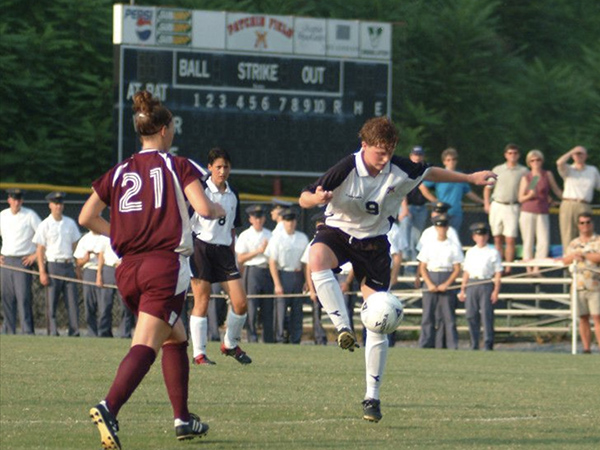
The first women’s soccer match was held on Patchin Field Aug. 29, 2003. VMI won against Bridgewater College, 4-0.—Photo courtesy of VMI Archives.
NCAA adheres to Title IX of the Education Amendments Act of 1972, which is a federal law. It requires that women and men be provided equitable opportunities to participate. The law does not require any institution to offer identical sports, but an equal opportunity to play. The opportunities to play are based on enrollment numbers. At VMI, female enrollment is generally at 13% to 14% of total enrollment, so the Institute must meet or exceed that percentage of the spots for female players. “It’s actually closer to 20%,” said Lenny Brown, assistant athletic director. “We offer seven NCAA sponsored sports for women: soccer, swimming and diving, water polo, indoor track and field, outdoor track and field, cross country, and women’s rifle.”
Because building a women’s athletic program took many years, VMI received waivers from the NCAA until 2011, when they became fully compliant with the creation of the water polo team.
According to Lance Fujiwara, associate athletic director for sports medicine, initially volleyball was the first sport planned for women since only six players are required to form a team. “When the women were polled, it was determined that they preferred soccer,” said Fujiwara.
Julie Davis Carlson was the original head coach of the women’s soccer team. “We did not compete officially the first year of my assignment. I was part of proposing a start-up budget to get the program off the ground and prepare for its first year of Big South Conference competition. We utilized the club team that was in existence, and they helped with recruiting. So our first year we had a small club season, trained and maneuvered through the challenges, which included recruiting women to come and re-recruiting them to stay,” said Carlson, who is currently head coach and technical director for the Greenville Liberty, a pre-professional women’s soccer team, which competes in the USL W league, and based in Greenville, South Carolina.
Legacy
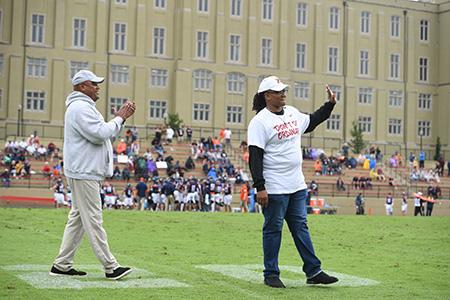
Mildred Cooper ’05, the first female inducted into the VMI Sports Hall of Fame, joins Zack Scott, track and field and cross country director, on the field in Foster Stadium during a special recognition Sept. 10.—VMI Photo by H. Lockwood McLaughlin.
Gussie Lord ’01, who was one of the first female cadets, and who graduated with a degree in English with distinction, was appointed to the Board of Visitors by Gov. Ralph Northam ’81 in July 2021. Also serving on the Board of Visitors is Lara Tyler Chambers ’03, who graduated with a degree in civil engineering.
Erin Claunch ’01, also in the first class of women, was named the first female battalion commander at VMI in 2000. Her stories of breaking barriers were featured in The Wall Street Journal, The Washington Post, the Los Angeles Times, Orlando Sentinel, among other publications.
The first female regimental executive officer, Elise Reed ’15, continues to display the VMI characteristics of hard work and time management, as she is a member of the Army Reserves and a mixed martial artist who recently turned pro.
Kasey Meredith ’22 became the first female regimental commander in VMI history when Troy Smith ’21 handed over leadership of the Corps of Cadets to her during the 2021 graduation parade.
Hannah Buttner ’26 matriculated this year and attended the Summer Transition Program. She is inspired by the female cadets who came before them. “That’s really cool that Kasey was the first female RCO. She is just four years older than us, so that’s not too far away. Hopefully that will become the norm here,” said Buttner.
Maj. Gen. Marti Bissell’s speech on post in September matched the sentiment of Buttner and many others. “I’ve kept an eye on VMI’s efforts to integrate women into the Corps and continued to advocate. …I look forward to the time when it’s not such a big deal when a female is chosen for a particular position.” Through her roles at VMI and the many alumni she has gotten to know, she knows this: “Change makes VMI better and the integration of women at VMI certainly did. But, for all of those changes there are also some things that do not change. Cadets that attend VMI want to challenge themselves, academically, athletically, militarily and that they will be better leaders, better individuals because of those experiences. Those who desire to come to VMI want to earn a place in the incredible VMI network because someone in the network made an impression, had some quality that they want to emulate. It's not the number of formations you stand in or the number of parades you march in that is important, it is the relationships you make and more importantly how you grow as an individual.”
Read Maj. Gen. Marti Bissell’s full speech from the evening of Sept. 9.
Maj. Michelle Elwood and Marianne Hause
Communications & Marketing
VIRGINIA MILITARY INSTITUTE
.svg)
.png)